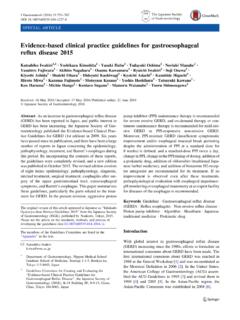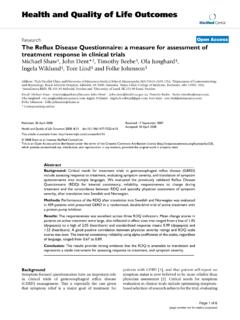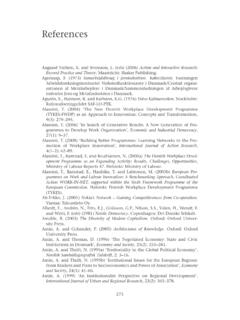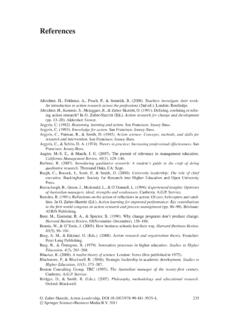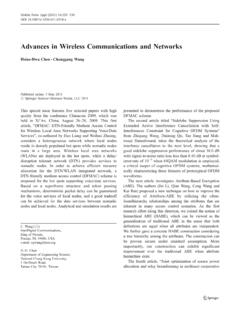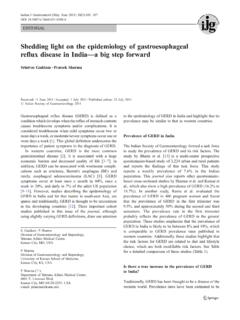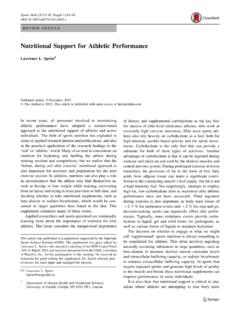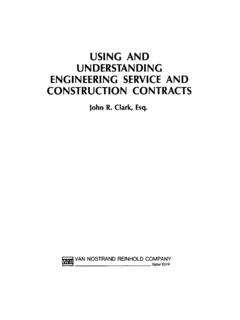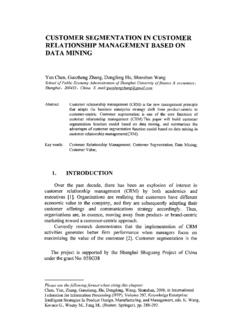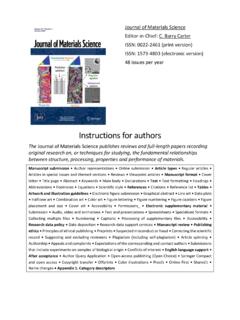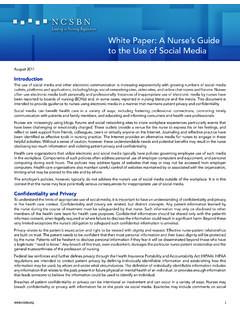Transcription of Guidelines for Perioperative Care in Elective ... - Springer
1 SCIENTIFIC REVIEWG uidelines for Perioperative Care in Elective Colorectal Surgery:Enhanced Recovery After Surgery (ERAS ) SocietyRecommendations: 2018U. O. Gustafsson1 M. J. Scott2,3 M. Hubner4 J. Nygren5 N. Demartines4 N. Francis6,7 T. A. Rockall8 T. M. Young-Fadok9 A. G. Hill10 M. Soop11 H. D. de Boer12 R. D. Urman13 G. J. Chang14 A. Fichera15 H. Kessler16 F. Grass4 E. E. Whang17 W. J. Fawcett18 F. Carli19 D. N. Lobo20 K. E. Rollins20 A. Balfour21 G. Baldini19 B. Riedel22 O. Ljungqvist23 Published online: 13 November 2018 The Author(s) 2018 AbstractBackgroundThis is the fourth updated Enhanced Recovery After Surgery (ERAS ) Society guideline presenting aconsensus for optimal Perioperative care in colorectal surgery and providing graded recommendations for eachERAS item within the ERAS wide database search on English literature publications was performed.
2 Studies on each item within theprotocol were selected with particular attention paid to meta-analyses, randomised controlled trials and largeprospective cohorts and examined, reviewed and graded according to Grading of Recommendations, Assessment,Development and Evaluation (GRADE) recommendations on ERAS protocol items are based on best available evidence; good-quality trials;meta-analyses of good-quality trials; or large cohort studies. The level of evidence for the use of each item ispresented evidence base and recommendation for items within the multimodal Perioperative care pathway arepresented by the ERAS Society in this comprehensive consensus O. of Surgery, Danderyd Hospital and Departmentof Clinical Sciences, Danderyd Hospital, KarolinskaInstitutet, Stockholm, Sweden2 Department of Anesthesia, Virginia CommonwealthUniversity Hospital, Richmond, VA, USA3 Department of Anesthesiology, University of Pennsylvania,Philadelphia, USA4 Department of Visceral Surgery, CHUV, Lausanne,Switzerland5 Department of Surgery, Ersta Hospital and Department ofClinical Sciences, Danderyd Hospital, Karolinska Institutet,Stockholm, Sweden6 Colorectal Unit, Yeovil District Hospital,Higher Kingston, Yeovil BA21 4AT, UK7 University of Bath, Wessex House Bath BA2 7JU, UK8 Department of Surgery, Royal Surrey County Hospital NHST rust, and Minimal Access Therapy Training Unit(MATTU)
3 , Guildford, UK9 Division of Colon and Rectal Surgery, Department ofSurgery, Mayo Clinic, Phoenix, AZ, USA10 Department of Surgery, Faculty of Medical and HealthSciences, University of Auckland Middlemore Hospital,Auckland, New Zealand11 Irving National Intestinal Failure Unit, The University ofManchester, Manchester Academic Health Science Centre,Salford Royal NHS Foundation Trust, Manchester, UK12 Department of Anesthesiology, Pain Medicine andProcedural Sedation and Analgesia, Martini GeneralHospital, Groningen, The Netherlands13 Department of Anesthesiology, Perioperative and PainMedicine, Brigham and Women s Hospital, Harvard MedicalSchool, Boston, MA, USA123 World J Surg (2019) 43:659 695 Enhanced Recovery After Surgery (ERAS ) Societycare pathways include evidence-based items designed toreduce Perioperative stress, maintain postoperative physi-ological function and accelerate recovery after such a multimodal stress-minimising approach hasbeen shown repeatedly to reduce rates of morbidity,improve recovery and shorten length of stay (LOS) aftermajor colorectal surgery [1 7].
4 Since the first Guidelines were published in 2005 [8],more colorectal operations are being performed usingminimally invasive techniques. Furthermore, the evidencebase underpinning all Perioperative care items is in con-tinuous development, which necessitates frequent updatesof the knowledge base. This article represents the jointefforts of the ERAS Society ( ) andauthors from other international ERAS chapters to presentan updated consensus review of Perioperative care forcolorectal surgery based on best current searchStarting from our previous Guidelines in colon [9] and rectal[10] surgery published in 2013 the first and last authoridentified topics for inclusion. International authors knownfor their expertise in each item, respectively, and in overallperioperative care were invited to participate in the invited authors accepted participation and receivedinstructions for the literature search.
5 PubMed, Embase andCochrane databases were used to identify relevant contri-butions from January 2012 (end date for the search in thepreviously published Guidelines [9]) and October colon , rectum , enhancedrecovery , ERAS and fast track . Meta-analyses ran-domised controlled trials (RCTs) and prospective/retro-spectivecohortstudiesw ereconsideredforeachperioperative item. The individual authors screened titlesand abstracts in order to identify relevant articles. The firstand last author then repeated this assessment and data analysesThe Cochrane checklist [11] was used to assess method-ological quality of the included studies. Quality of evi-dence and recommendations were evaluated according tothe Grading of Recommendations, Assessment, Develop-ment and Evaluation (GRADE) system.
6 Quoting from theGRADE statement [12 14], the recommendations aregiven as follows:Strong recommendations:The panel is confident that thedesirable effects of adherence to a recommendation out-weigh the undesirable recommendations:The desirable effects ofadherence to a recommendation probably outweigh theundesirable effects, but the panel is less are based on quality of evidence(high, moderate, low) but also on the balance betweendesirable and undesirable effects; and on values and pref-erences of practitioners. Thus, strong recommendationsmay be reached from low-quality data and vice or two authors covered the evidence base for eachitem. The quality of evidence for each item was thenreviewed and crosschecked by several other authors in theauthor evidence and recommendations for ERAS items arepresented in four different headings.
7 Preadmission, preop-erative, intraoperative and postoperative and are numbered14 Department of Surgical Oncology and Department of HealthServices Research, The University of Texas, MD AndersonCancer Center, Houston, TX, USA15 Division of Gastrointestinal Surgery, Department of Surgery,University of North Carolina at Chapel Hill, Chapel Hill, NC,USA16 Department of Colorectal Surgery, Digestive DiseaseInstitute, Cleveland Clinic, Ohio, USA17 Department of Surgery, Brigham and Women s Hospital,Harvard Medical School, Boston, MA, USA18 Department of Anaesthesia, Royal Surrey County HospitalNHS Foundation Trust and University of Surrey, Guildford,UK19 Department of Anesthesia, McGill University Health Centre,Montreal General Hospital, Montreal, QC, Canada20 Gastrointestinal Surgery, Nottingham Digestive DiseasesCentre and National Institute for Health Research (NIHR)Nottingham Biomedical Research Centre, NottinghamUniversity Hospitals NHS Trust and University ofNottingham, Queen s Medical Centre,Nottingham NG7 2UH, UK21 Department of Colorectal Surgery, Surgical Services,Western General Hospital, NHS Lothian, Edinburgh, UK22 Department of Anaesthesia, Perioperative and Pain Medicine,Peter MacCallum Cancer Centre, University of Melbourne,Melbourne, Australia23 Department of Surgery, O rebro University and UniversityHospital, O rebro & Institute of Molecular Medicine andSurgery, Karolinska Institutet, Stockholm, Sweden660 World J Surg (2019) 43:659 695123in the order they are to be used in clinical practice.
8 Asummary figure ( ,2,3,4) shows an overview of thequality of evidence and grade of recommendation for eachphase of the Perioperative course. Table1shows all theERAS base and recommendationsPreadmission itemsSee Preadmission information, education andcounsellingComprehensive preoperative counselling has severalimportant goals. First, as patients fear the unknown, properand complete information may reduce anaesthesia- andsurgery-related anxiety and subsequent pain [15 19]. Sec-ondly, the patient s preparedness, satisfaction and overallsurgical experience may be improved considerably bydetailed, procedure-specific and patient-centred informationgiving sessions [20 22]. As a consequence of this psycho-logical support, a positive impact of preoperative informa-tion on LOS and postoperative outcomes has been reportedin an RCT and a Cochrane analysis [23,24].
9 Modern edu-cation strategies including multimedia or virtual realityexperiences may be considered [15,25]. Patients and rela-tives/carers should meet with a multidisciplinary teamcomprising a surgeon, anaesthesiologist and most impor-tantly a nurse or allied health professional, all whom have arole in guiding the patient through the surgery-relatedexperience before admission to the hospital [26].Summary and recommendation:Patients should receive dedicated preoperative coun-selling of evidence:Moderate (study quality, heteroge-neous endpoints)Recommendation grade:Strong2. Preoperative optimisationRisk assessmentThere are several examples of preoperative risk assess-ment scores proposed in the literature [27 30] but due tothe low level of evidence of these scores, their use islimited.
10 For instance, while it is generally believed that amultidisciplinary team should evaluate patients with a highrisk of cardiac disease undergoing major surgery, the levelof evidence for this intervention is very low [29]. Whilenutritional assessment and intervention seem to be usefulfor the high-risk malnourished patients, there is only oneprospective study available [28]. For more general preop-erative risk assessment tools, prospective data showing anyeffect on outcomes are lacking [27]. Most commonly toolsdescribe control of systemic diseases such as optimisationof heart disease, lung disease, kidney disease, hypertension,diabetes, correction of derangements such as anaemia andmalnutrition, and cessation of excessive alcohol use andsmoking. This section refers to the latter two aspects,which are mainly under the control of the cessationPatients who smoke have an increased risk of intra- andpostoperative complications [31].
